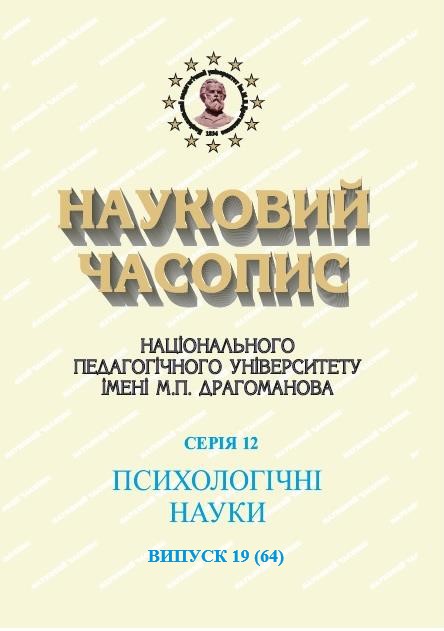THEORETICAL PRINCIPLES OF NEGOTIATION AND PSYCHOLOGICAL FEATURES OF PARTNERS’ AVOIDANCE IN INTERNATIONAL INTERACTION CONFLICTS
DOI:
https://doi.org/10.31392/NPU-nc.series12.2022.19(64).03Keywords:
conflicts, communication, education, negotiations, international information, psychology.Abstract
The article reveals the formation of scientific world and national opinion regarding human psychology and the peculiarities of the origin, course and establishment of cause-and-effect relationships of conflicts in international interactions. When performing situational analyses on educational components with international students, practical methods of learning psychological skills through personality analysis are highlighted. The key competences of two important and relevant majors “International Relations, Public Communications and Regional Studies” and “Psychology” are combined, and their application in students’ practical classes is shown. The main task to continue replenishing the intellectual composition of the nation, to prepare young people for the future of our country with the prospect of joining the EU is highlighted. It is specified that sufficient attention was paid to the stated problem in the works of Ukrainian and foreign scientists, namely, the professional training of applicants for future professional activities, students training by means of independent work, issues of personal growth, psychological features of conflict avoidance during the negotiation process, issues of peace and conflict resolution, ethnic conflicts occurring in the world, global problems and problems within a single country. It is established that world politicy moves precisely due to conflicts, the conflict behavior of an individual person or the conflict behavior of a group of people, especially if these people lead the state. From the analyzed base of sources, it was concluded that all the works are about human behavior during communications, negotiations and obtaining information, which is the basis of teaching the educational components “Conflictology and theory of negotiations”, “Introduction to the specialty and the law of a specialist”, “International information” to international applicants, since professional activity involves not only knowledge of world politics, but also understanding of human behavior and prevention of conflicts in international relations. These disciplines are mandatory in the professional training cycle.
References
- Andrushchenko, T.V. (E) (2021). Osnovy politychnoi psykholohii: navchalnyi posibnyk dlia studentiv spetsialnosti 053 «psykholohiia» [Basics of political psychology: a study guide for students of specialty 053 "psychology"]. Kyiv : Vyd-vo NPU imeni M.P. Drahomanova [in Ukrainian].
- Andrushchenko, T.V., Kovchyna, I.M., Panchenko, M.V., & Pasichnichenko, S.V. (2017). Aktualni problemy formuvannia kompetentnostei u studentiv – maibutnikh fakhivtsiv z mizhnarodnykh vidnosyn [Actual problems of competence formation among students - future specialists in international relations]. Naukovi zapysky. Ceriia pedahohichni nauky – Proceedings. Pedagogical science series, ХХХVI(136), 5–13. [in Ukrainian].
- Bulakh, I.S. (2016). Psykholohiia osobystisnoho zrostannia pidlitkiv : realii ta perspektyvy [Psychology of personal growth of teenagers : realities and prospects]. Vinnytsia : TOV «Nilan-LTD» [in Ukrainian].
- Voloshyna, V.V. (2016). Psykholohiiani tekhnolohii pidhotovky maibutnikh psykholohiv [Psychological technologies of training future psychologists]. Vinnytsia : TOV «Nilan-LTD» [in Ukrainian].
- Kovchyna, I.M., & Panchenko, M.V. (2018). Do problemy orhanizatsii samostiinoi roboty studentiv-mizhnarodnykiv [To the problem of organizing independent work of international students.]. Naukovi zapysky. Seriia pedahohichni nauky – Proceedings. Pedagogical science series, Issue SXXVIII (138), 106–118 [in Ukrainian].
- Abrams, (2022). The role of psychological warfare in the battle for Ukraine, American psychological association, 53(4). Retrieved from https://www.apa.org/monitor/2022/06/news-psychological-warfare
- Deutsch,, Coleman, P.T.,& Marcus, E.C. (2014). The Handbook of Conflict Resolution: Theory and Practice. San Francisco : Jossey-Bass. Retrieved from https://scholar.google.com/scholar?q=The+Handbook+of+Conflict+Resolution:+Theory+and+Practice&hl=
uk&as_sdt=0&as_vis=1&oi=scholart - Friehs, M-T., Kotzur, P.F., Ramos,, & Wagner, U. (2022). Group-Focused Enmity–conceptual, longitudinal, and cross-national perspectives based on pre-registered studies, International Journal of Conflict and Violence, 16, 1–17. Retrieved from https://scholar.google.de/citations?view_op=view_citation&hl=en&user=mfDzz7kAAAAJ&citation_for_view=
mfDzz7kAAAAJ:WF5omc3nYNoC - Fitzduff, M. (2021). Our Brains at War: The Neuroscience of Conflict and Peacebuilding. Oxford : Oxford University. Retrieved from https://www.pon.harvard.edu/events/kelman-fitzduff-our-brains-at-war/
- Hauss, C. (2015). Security 2.0: Dealing with Global Wicked Problems (Peace and Security in the 21st Century) Lanham, Maryland : Rowman & Littlefield Publishers. Retrieved from https://carterschool.gmu.edu/node/716
- Kelman,C. (2015).The Development of Interactive Problem Solving: In John Burton's Footsteps. Political Psychology, 36(2), 243–262. Retrieved from https://scholar.harvard.edu/hckelman/home
- Majer,M., Loschelder, D.D., Windolph, L.J., & Fischer, D. (2018). How Sustainability-Related Challenges Can Fuel Conflict Between Organizations and External Stakeholders : A Social Psychological Perspective to Master Value Differences, Time Horizons, and Resource Allocations. Umweltpsychologie, 22(2), 53–70. Retrieved from https://scholar.google.com/citations?user=jySpbDoAAAAJ&hl=de.
- Randolph, (2016). The Psychology of Conflict: Mediating in a Diverse World, IL, U.S.A. : Bloomsbury Continuum. Retrieved from https://elibrary.law.psu.edu/cgi/viewcontent.cgi?article=1202&context=
arbitrationlawreview - Richmond, (2016). The fallacy of constructing hybrid political orders: a reappraisal of the hybrid turn in peacebuilding. International Peacekeeping, 23(2), 219–239. Retrieved from https://www.research.manchester.ac.uk/portal/oliver.richmond.html.
- Volkan,, & Richards, B. (2021). Large-group psychology and political conflicts: an introduction to the psychosocial work of Vamik Volkan. Journal of Psychosocial Studies. Volume 14(1), 63–71. Retrieved from https://bristoluniversitypressdigital.com/view/journals/jps/14/1/article-p63.xml

